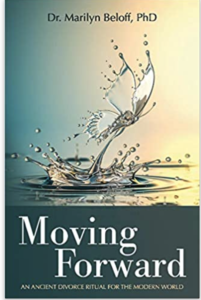
Profound Thoughts About Divorce from Moving Forward: An Ancient Divorce Ritual for the Modern World, by Marilyn Beloff, Ph.D.
My tears flowed freely as I finally began to experience the death of my marriage and the death of the dream; the pain was palpable and no less than that experienced at the death of a loved one. (p. 11). BookBaby. Kindle Edition.
Neither… civil law nor counseling had provided me with a format to bring psychological closure to my pain… In our modern society, the transformation from married to single state is made through the courts, with the final divorce decree arriving in the mail.
I, like so many of my personal friends and clients, found the journey from one phase of life to the next to be solitary and immeasurably painful. Unlike the elaborate and highly structured rituals marking births, baptisms, graduations, marriages, and deaths, we go through the process of divorce without ritual. In my secular world, I could find no vehicle to carry the psychological process as I moved through the inevitable pain and transformation, no sacred space in which I could say goodbye to my former spouse and move forward, leaving resentments behind. (pp.9-10). BookBaby. Kindle Edition.
Our society provides no sacred space in which we can say goodbye to our former spouses and move forward, leaving resentments behind, allowing us to emerge reborn as single, independent, and free individuals. Often, the “divorced” person is left seething with resentment, and, tragically, it is the children who become the recipients of the pain that secular divorcing adults have had no way to discharge together. (p. 14). BookBaby. Kindle Edition.
One man’s thoughts: “There was no satisfaction in a legal divorce. A legal divorce is wrapped up with money and continued obligation. It is a divorce of some sort, but it’s really all about transition into the future and different identities where I still owe you this and you owe me this, and we divide the children in a certain way. It deals with the future of the relationship and puts it in legalistic terms where the government and certain legal obligations are the focus rather than an emotional ending of a relationship.”
There is a sense of depression, a sense of… you have this enormous loss and have nothing else but that, not only is your relationship going, there is half of everything you have created in your house.
You are financially in a mess, you’ve got tremendous work pressures, by the time the divorce actually goes through, you’ve gone through one or two years of hell emotionally and tearing everything apart; so at the same time, you have no money left, you have no emotional guck left, half your friends are gone for sure, generally two-thirds of them. Half of them side with the other person, and another third doesn’t want to be involved with either of you because you are now available, which means some people think you are going to come after their mate. So the whole thing is pretty rough and there is not even an acknowledgment of it in our society generally. That’s why the Get is so satisfying. (pp. 48-49). BookBaby. Kindle Edition.
“’What if we, as a culture, honestly faced the death and fragility of our relationships and our truths around divorce, giving divorce its due through a formal ritual rite of passage?’ With her book, Beloff takes a bold step onto this new terrain.” Nancy Cameron, author of Collaborative Practice: Deepening the Dialogue, and former president of the International Academy of Collaborative Professionals, quoting Marilyn Beloff, Ph.D., in her Forward to the book, Moving Forward: An Ancient Divorce Ritual for the Modern World.” (p. 6). BookBaby. Kindle Edition.
Perhaps, rather than denying, medicating, and pathologizing divorce and the families going through this traumatic event, we can begin to confront the death of marriages head on and move forward. (p.18). BookBaby. Kindle Edition.
What to do once you acknowledge the end of your relationship is like a death? See Part 2 in this Series, “The Death of Your Relationship.”











